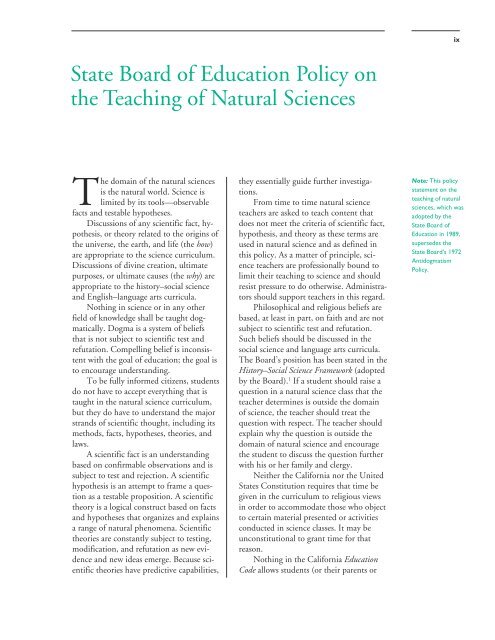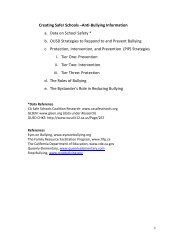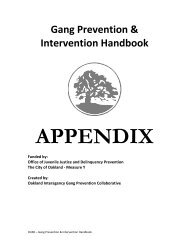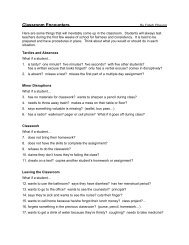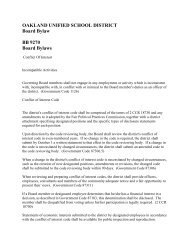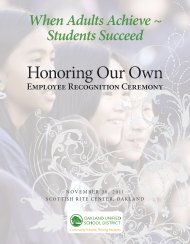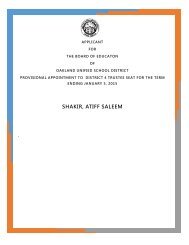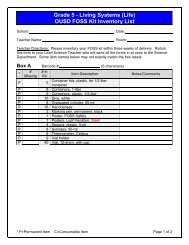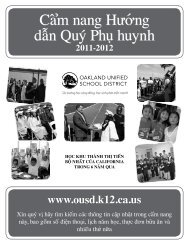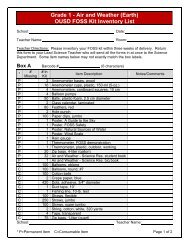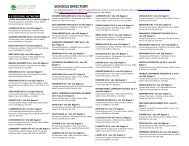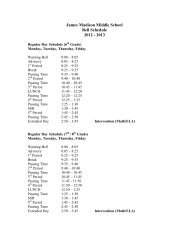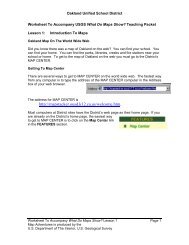Science Framework, part 1 - Free Downloads (CA Dept of Education)
Science Framework, part 1 - Free Downloads (CA Dept of Education)
Science Framework, part 1 - Free Downloads (CA Dept of Education)
- No tags were found...
You also want an ePaper? Increase the reach of your titles
YUMPU automatically turns print PDFs into web optimized ePapers that Google loves.
ixState Board <strong>of</strong> <strong>Education</strong> Policy onthe Teaching <strong>of</strong> Natural <strong>Science</strong>sThe domain <strong>of</strong> the natural sciencesis the natural world. <strong>Science</strong> islimited by its tools—observablefacts and testable hypotheses.Discussions <strong>of</strong> any scientific fact, hypothesis,or theory related to the origins <strong>of</strong>the universe, the earth, and life (the how)are appropriate to the science curriculum.Discussions <strong>of</strong> divine creation, ultimatepurposes, or ultimate causes (the why) areappropriate to the history–social scienceand English–language arts curricula.Nothing in science or in any otherfield <strong>of</strong> knowledge shall be taught dogmatically.Dogma is a system <strong>of</strong> beliefsthat is not subject to scientific test andrefutation. Compelling belief is inconsistentwith the goal <strong>of</strong> education; the goal isto encourage understanding.To be fully informed citizens, studentsdo not have to accept everything that istaught in the natural science curriculum,but they do have to understand the majorstrands <strong>of</strong> scientific thought, including itsmethods, facts, hypotheses, theories, andlaws.A scientific fact is an understandingbased on confirmable observations and issubject to test and rejection. A scientifichypothesis is an attempt to frame a questionas a testable proposition. A scientifictheory is a logical construct based on factsand hypotheses that organizes and explainsa range <strong>of</strong> natural phenomena. Scientifictheories are constantly subject to testing,modification, and refutation as new evidenceand new ideas emerge. Because scientifictheories have predictive capabilities,they essentially guide further investigations.From time to time natural scienceteachers are asked to teach content thatdoes not meet the criteria <strong>of</strong> scientific fact,hypothesis, and theory as these terms areused in natural science and as defined inthis policy. As a matter <strong>of</strong> principle, scienceteachers are pr<strong>of</strong>essionally bound tolimit their teaching to science and shouldresist pressure to do otherwise. Administratorsshould support teachers in this regard.Philosophical and religious beliefs arebased, at least in <strong>part</strong>, on faith and are notsubject to scientific test and refutation.Such beliefs should be discussed in thesocial science and language arts curricula.The Board’s position has been stated in theHistory–Social <strong>Science</strong> <strong>Framework</strong> (adoptedby the Board). 1 If a student should raise aquestion in a natural science class that theteacher determines is outside the domain<strong>of</strong> science, the teacher should treat thequestion with respect. The teacher shouldexplain why the question is outside thedomain <strong>of</strong> natural science and encouragethe student to discuss the question furtherwith his or her family and clergy.Neither the California nor the UnitedStates Constitution requires that time begiven in the curriculum to religious viewsin order to accommodate those who objectto certain material presented or activitiesconducted in science classes. It may beunconstitutional to grant time for thatreason.Nothing in the California <strong>Education</strong>Code allows students (or their parents orNote: This policystatement on theteaching <strong>of</strong> naturalsciences, which wasadopted by theState Board <strong>of</strong><strong>Education</strong> in 1989,supersedes theState Board’s 1972AntidogmatismPolicy.


